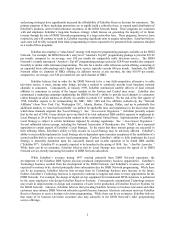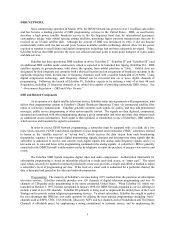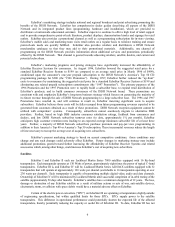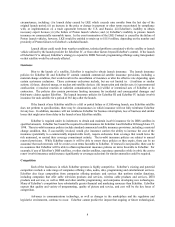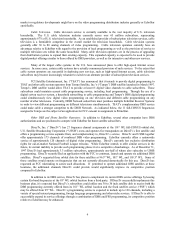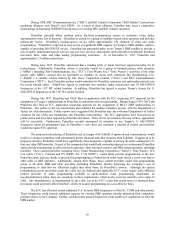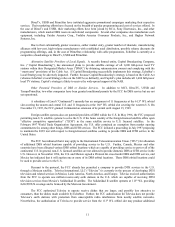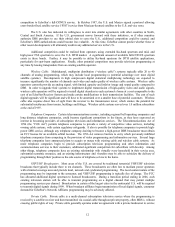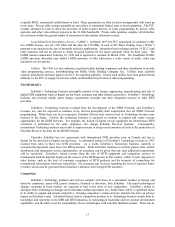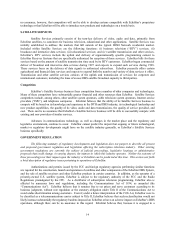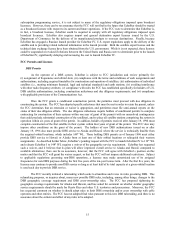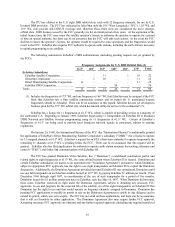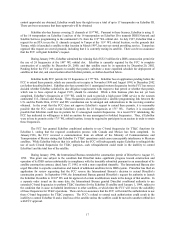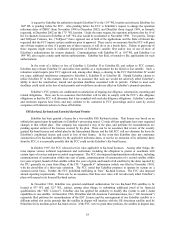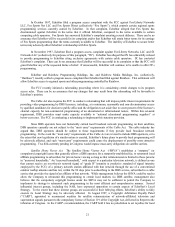Dish Network 1997 Annual Report Download - page 13
Download and view the complete annual report
Please find page 13 of the 1997 Dish Network annual report below. You can navigate through the pages in the report by either clicking on the pages listed below, or by using the keyword search tool below to find specific information within the annual report.11
DirecTv, USSB and PrimeStar have instituted aggressive promotional campaigns marketing their respective
services. Their marketing efforts have focused on the breadth of popular programming and cost of services offered. In
the case of DirecTv and USSB, their marketing efforts have been joined by RCA, Sony Electronics, Inc., and other
manufacturers, which market DBS receivers and related components. Several other companies also manufacture such
equipment, including Uniden America Corp., Toshiba America Consumer Products, Inc., and Hughes Network
Systems, Inc.
Due to their substantially greater resources, earlier market entry, greater number of channels, manufacturing
alliances with low-cost, high-volume manufacturers with established retail distribution, possible volume discounts for
programming offerings, and, in the case of PrimeStar, relationship with cable programmers, EchoStar is currently at a
competitive disadvantage to DirecTv, USSB and PrimeStar.
Alternative Satellite Providers of Local Signals. A recently formed entity, Capitol Broadcasting Company,
Inc. (“ Capitol Broadcasting”), has announced plans to provide satellite carriage of all 1,600 full-power local TV
stations within their Designated Market Areas (“ DMA” ) by obtaining retransmission consent and complying with the
“ must-carry” provisions of the Cable Act. If Capitol Broadcasting successfully implements this strategy, EchoStar’s
Local Strategy may be adversely impacted. Further, because Capitol Broadcasting’s strategy is based on the Cable Act
(whereas EchoStar’s Local Strategy relies on the SHVA (as defined)), and Capitol’s plan includes all 1,600 full-power
local TV stations, Capitol’s strategy is likely to receive the wide-spread support of the NAB.
Other Potential Providers of DBS or Similar Services. In addition to MCI, DirecTV, USSB and
Tempo/PrimeStar, two other companies have been granted conditional permits by the FCC for DBS service but are not
yet operational.
A subsidiary of Loral (“ Continental”) currently has an assignment of 11 frequencies at the 61.5° WL orbital
slot covering the eastern and central U.S. and 11 frequencies at the 166° WL orbital slot covering the western U.S. On
November 21, 1995, the FCC granted Continental an extension of its permit until August 15, 1999.
Foreign satellite systems also are potential providers of DBS within the U.S. In May 1996, the FCC proposed
permitting non-U.S. satellite systems to serve the U.S. if the home country of the foreign-licensed satellite offers open
“ effective competitive opportunities” (“ ECO”) in the same satellite service to U.S. licensed satellites. In the
February 1997 World Trade Organization Agreement, the U.S. offer contained an exemption from market opening
commitments for, among other things, DBS and DTH services. The FCC initiated a proceeding in July 1997 proposing
to maintain the ECO test with respect to foreign-licensed satellites seeking to provide DBS and DTH service in the
United States.
The FCC has indicated that it may apply to the International Telecommunication Union (“ ITU”) for allocation
of additional DBS orbital locations capable of providing service to the U.S. Further, Canada, Mexico and other
countries have been allocated various DBS orbital locations which are capable of providing service to part or all of the
continental U.S. In general, non-U.S. licensed satellites are not allowed to provide domestic DBS or DTH service in the
U.S. However, in November 1996, the U.S. and Mexico signed a Protocol for cross-border DBS and DTH service, and
Mexico has indicated that it will auction one or more of its DBS orbital locations. Those DBS orbital locations could
be used to provide service to the U.S.
Pursuant to the protocol, the FCC already has permitted a company to provide DTH services in the U.S.
through a Mexican satellite. Televisa International, LLC (“ Televisa”) is currently in the process of developing DTH
television and related services in Mexico, Latin America, North America, and Europe. Televisa received authorization
from the FCC to operate one million receive-only earth stations in the U.S. which are capable of receiving DTH
television services from Mexico’s Solidaridad II satellite. The Solidaridad II satellite operates at 113° WL providing
full-CONUS coverage and is licensed by the Mexican Government.
The FCC authorized Televisa to operate receive dishes that are larger, and possibly less attractive to
consumers, than the dishes made available by EchoStar. Further, the FCC authorization for Televisa does not provide
Televisa’s earth stations with protection from unacceptable radio interference from nearby satellite networks.
Nevertheless, the authorization of Televisa to provide service from the 113° WL orbital slot may produce additional



